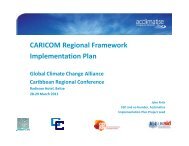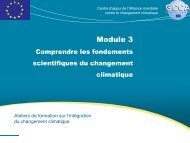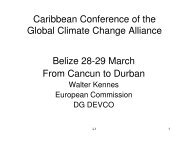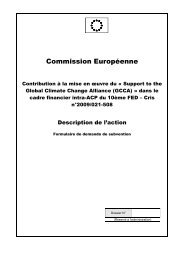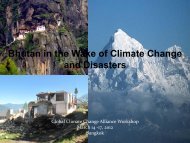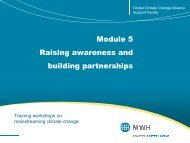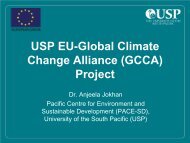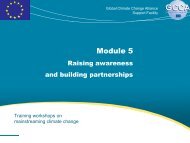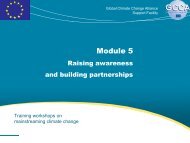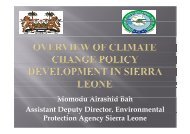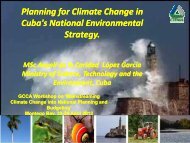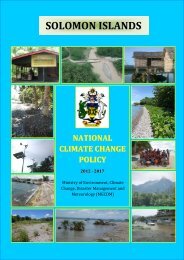Rwanda Green Growth Strategy 18nov11 - Global Climate Change ...
Rwanda Green Growth Strategy 18nov11 - Global Climate Change ...
Rwanda Green Growth Strategy 18nov11 - Global Climate Change ...
You also want an ePaper? Increase the reach of your titles
YUMPU automatically turns print PDFs into web optimized ePapers that Google loves.
Detailed Programmes of ActionProgramme 10: Low Carbon Urban SystemsResponsible Stakeholders (lead in bold)MININFRA, RHA, KCC, Real Estate Developers, Private SectorSummary of Programmes and ActionsWith increasing numbers of people inhabiting urban areas of <strong>Rwanda</strong>, particularly Kigali, it is necessary toimplement a long-term plan for urban areas, to ensure that they are low-carbon and therefore sustainable.To achieve this, <strong>Rwanda</strong> will adopt energy and water efficiency standards into building codes; establish anintegrated multi-mode urban transport system; employ low carbon urban planning; and fully utilise urbanwaste as a resource stream. Action 1: Low energy buildings and servicesThe implementation of low energy standards in buildings and services in <strong>Rwanda</strong> could result in an 80%reduction in energy use over current global practice. Efficient systems often have higher upfront costs thatcan be rapidly recovered when compared to more inefficient systems. <strong>Rwanda</strong> will adopt a national lowenergy building standard, enshrined in the building codes, to produce the necessary behaviour change inthe industry, without costly intervention in the sector by the state. These standards will be built aroundsystems, such as passive housing principles that are technically appropriate, have minimal upfront costs,and little or no operational costs. Such systems take advantage of direct solar gain for heating, insulationand thermal capacity for temperature regulation and shading and ventilation for cooling. The recovery of greywater and rainwater should also be inserted into the building codes to support water efficiency andconservation. The goods and services used within buildings will also be regulated. Efficient technologies,such as solar hot water and distributed power generation, will be championed over inefficient systems suchas electric immersion heaters. Action 2: Integrated Multi-mode Urban TransportThe adoption of urban transport systems will not only reduce carbon emissions, but lower barriers to accessfor transport, increasing the mobility of the population and thus opportunities for economic development. Itis crucial that transport networks are heavily linked to urban planning through transit orientateddevelopments to maximise the level of access to costly infrastructure. <strong>Rwanda</strong> will implement a multi-modeapproach to prevent dependencies on a single mode, and to offer the greatest range of opportunities to thepopulation. Action 3: Urban PlanningHigh density clusters consist of mixed use, co-located urban systems, centred on local services. Theypromote ‘walk-able’ lifestyles, reducing the need for transport, and therefore energy consumption. Walk-ablelifestyles, enabled by access to local, neighbourhood services and an attractive public realm (parks, squares,pathways) also have health benefits through increased exercise and social impacts through increasedcommunity interaction. <strong>Rwanda</strong> will implement distributed urban centres, clustered around services, such aseducation and distributed energy generation. They will be well linked by mass transit both to each other andto the central business district. Preventing construction on unsuitable sites, such as flood plains and steepslopes, will increase the resilience o climate change of urban areas. These policies are already enshrined inthe Kigali Conceptual Master-plan, which will form the basis for a national urban development plan that willlay out the key criteria for developments of all sizes across <strong>Rwanda</strong>. Action 4: Utilisation of the Waste Stream<strong>Rwanda</strong> is failing to take advantage of a highly valuable resource: its municipal, agricultural and industrialwaste. Various low cost value-adding activities, such as composting or reuse and recycling, can turnformerly low value goods into high value resources. <strong>Rwanda</strong> will apply these processes to not only developanother resource stream, enabling entrepreneurship and economic development, but also to lower theinputs required by its systems, thus reducing the energy requirement and therefore urban systems climateimpact.74Government of <strong>Rwanda</strong>



